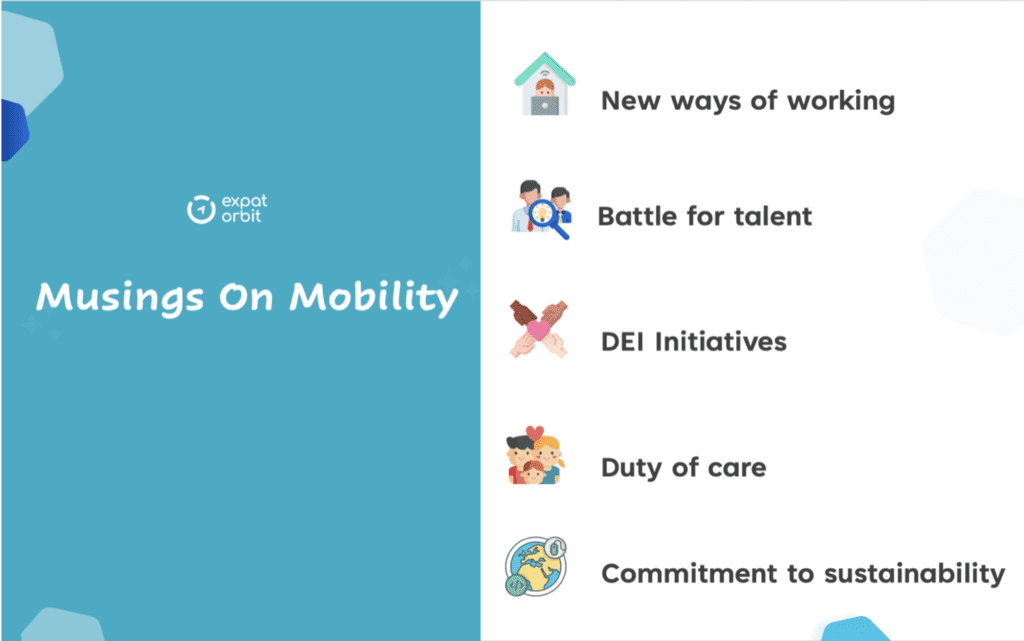Global Mobility Musings: Learnings And Trends For 2023

You could be a fresh-out-of-college tech developer from India, working for a Japanese company, while soaking in Fiji’s sunrise, turquoise waters, and white-sand beaches.
The industry which was considered dead in the age of covid has risen like a phoenix. Global Mobility sure did not let a good crisis go to waste.
The definition of Permanent Establishment has gone from complicated to more complicated.
It’s not just about Employment Visas now. It’s also Digital Nomad Visas.
It’s no more cross-border work. It’s also cross-border ‘remote’ work.
It’s not ‘either work or vacation’, it’s workcation.
Summary
Global Mobility is not just physical mobility.
It is also remote work and virtual mobility (a situation where employees are assigned to roles for new locations while performing their duties from home/ a third location)
As the year draws to a close, we reflect on the Global Mobility industry, the trends, the changes, its flaws, its evolution, and what it means for the global talent landscape and our world of work.

Musings on Mobility (in no particular order)
1. Remember the story of the Ugly Duckling?
Expats tend to find themselves in a similar situation. They need to adjust to radically different cultures and unfamiliar ways of working while fulfilling their work duties.
In a world where managing domestic workforce is getting tougher with quiet quitting and quiet firing making flashy headlines, managing an expatriate workforce is getting even more complex.
Add to this mix, remote and virtual working. Today’s workforce is a motley mix of no less than 5 cultures and nationalities.
As a result, collaboration and cultural & social intelligence have become one of the most sought-after skills in the world of work today.
2. Expats and their families
Family concerns such as leaving parents behind, partner career issues, children’s education, adjustment challenges, etc. remain the #1 reason for assignment refusal and assignment failure. Mobility practices also often lag in applyingchanging definitions of family.
The definition of ‘family’ changes with country, culture, and time. For instance, unlike in many western countries, Indians consider parents and siblings as an integral part of the family.
Perhaps mobility managers should consider the family component of the policy on a case-to-case basis to make the transition easier for the expat.
(We recommend this HBR article to expats to understand how they can ease the transition for their families)
3. Women and LGBTQ+ expats
Despite evidence suggesting that women’s cross-cultural relational skills are better than men’s, they make up only 20-25% of all international secondees.
The industry needs to ponder why there are fewer women expats than men. Are organizations less likely to select women for expat assignments? Or is it the women who turn down the assignments? Perhaps because of family responsibilities or concerns about spousal adjustment. Evidence also suggests that even in countries where gender bias is not so rampant, women expats face discrimination in the workplace.
In disregarding women, organizations may not be selecting the best people for their international assignments. And their DEI initiatives go for a toss.
39% of LGBTQ+ employees have reported refusing assignments for fear of backlash. 61% of employers are unaware of conditions in countries of operation. This results in LGBTQ+ employees making uninformed decisions regarding relocating to hostile countries. If organizations pay attention to supporting their LGBTQ+ expatriates and they are sent to homonormative places, it can become a win-win for both the employers and employees.
4. Sustainability and Global Mobility
Millennials who will comprise as much as 3/4th of the workforce by 2025 are particularly sensitive to environmental and sustainability issues. There is a generational push for organizations to revisit their mobility plans. The carbon footprint of the mobility industry is huge.
Mobility teams can be the face of an organization’s commitment to sustainability and ESG initiatives.
A mix of remote assignments and physical mobility can change things for the better. Organizations can consider replacing short-term assignments with remote work. Offering employees subsidized public transport in the relocated country, swapping their car allowance with bicycle allowance, helping them source local furniture rather than having them ship it from their home country, and choosing accommodations that are equipped with eco-friendly amenities, are some very basic ways using which organizations can begin their environmentally friendly mobility programs.
5. Global Mobility and the Battle for Talent
The world over, talent supply chains are broken. Countries are depopulating and employers are left with unfilled positions at record levels. Korn Ferry has made dire projections. The world will face a talent deficit equivalent to Germany's population, resulting in $8.5 trillion in losses by 2030. The report claims that the United States could be facing a deficit of more than 6 million workers. Japan, Indonesia, and Brazil could have shortages of up to 18 million skilled workers each.
In stark contrast to these countries, will be countries like India. Globally, every one in five people below the age of 25 is an Indian. India is home to one of the largest talent pools in the world. A significant chunk of new workers will come from these young and skilled emerging economies like India.
The battle for talent is set to grow fiercer.
Mobility (physical, virtual, or remote) will be at the centre of employers’ strategies to overcome these talent shortages.
The world of work is changing. Global Mobility is changing. Leave alone countries, people will be living, talking, and working in a different dimension. Makes us excited to know what is in store for the future of the expat-verse!
Wishing everyone a very happy 2023!

